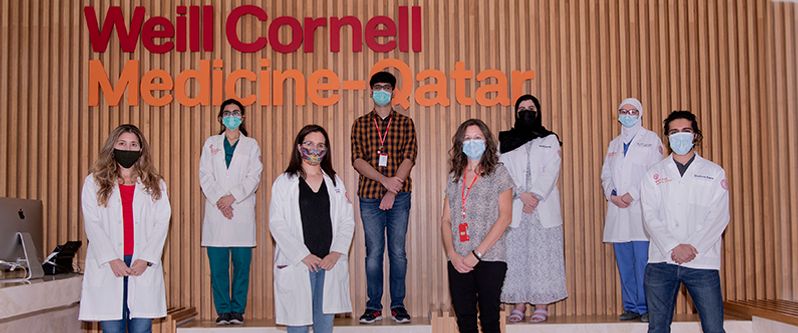WCM-Q research investigates therapeutic effects of Arabic music
 From left: Hanan Saba, Ridhima Kaul, Dr. Ghizlane Bendriss, Muhammad Janjua, Sarah Roach, Maryam Al-Quradaghi, Shahd Jaouni and Shehroz Rana, all of WCM-Q.
From left: Hanan Saba, Ridhima Kaul, Dr. Ghizlane Bendriss, Muhammad Janjua, Sarah Roach, Maryam Al-Quradaghi, Shahd Jaouni and Shehroz Rana, all of WCM-Q.
Researchers at Weill Cornell Medicine-Qatar (WCM-Q) have begun a unique clinical trial to investigate the effectiveness of Middle Eastern music as a therapeutic tool for a wide range of medical conditions.
While there has been significant research into music therapy approaches that use Western music, there has been very little focus on the use of Middle Eastern or Arabic music for therapeutic purposes. To contribute to research in neuromusicology worldwide, WCM-Q neuroscience researcher and premedical faculty Dr. Ghizlane Bendriss assembled a team consisting of neuroscientists, medical students, and an art therapist to investigate the effects of listening to Middle Eastern music on brain activity and mood.
The research employed two key assessment tools: electroencephalogram (EEG) to monitor brain activity in response to Arabic music, and standardized questionnaires designed to determine the subjects’ emotional state. The experimental recordings used in the research were specifically designed for this study and were composed by a musicologist and music educator at Qatar Foundation – M. Yassine Ayari – and played on traditional Arabic musical instruments (the ney, oud and qanun) by faculty from the Arab Music Department at Qatar Music Academy.
The study is believed to be the first in the world to utilize both neurophysiological and neuropsychological assessment tools to investigate the efficacy of Middle Eastern music for receptive music therapy in this way. Furthermore, the research has now received recognition from clinicaltrials.gov, a US-based registry maintained by the National Library of Medicine at the National Institutes of Health.
A key aim of the study, which is ongoing, is to determine whether music therapy approaches that draw upon Middle Eastern musical traditions achieve better results for populations with Middle Eastern heritage and musical preferences.
Dr. Bendriss, Lecturer in Biology, said: “There is a great deal of research supporting music therapy as an effective means for treating many illnesses, but the literature almost exclusively focuses upon Western music. Given that Western and Middle Eastern music use strikingly different scaling systems, rhythms and instruments, we identified this as a significant knowledge gap which is potentially preventing Middle Eastern populations from accessing an important form of therapy. We therefore devised a clinical trial to try to determine not only the neurophysiological and neuropsychological effects of music therapy using Middle Eastern music, but also how far culture might affect music perception, emotions and cognitive processes.”
To achieve this, the researchers play 24 different one-minute audio recordings of Arabic ‘Maqams’ – patterns of music of varying intervals and pitches – and analyze the changes in brain activity of the listeners using the EEG device. The subjects also have their emotional status assessed before and after the listening session, and in-between each audio clip, based on a standardized 60-item questionnaire called the expanded Positive and Negative Affect Schedule (PANAS-X), which measures a variety of positive and emotional states. The research draws inspiration from the extensive studies of the effects of Maqams on physiology and mental health conducted in the 10th century by revered philosophers of the Islamic Golden Age such as Al-Farabi and Avicenna.
The study, which is titled “An EEG-based exploration of the variables affecting cortical responses to Arab Music Scales for a personalized and effective Music Therapy in the Middle East: A Clinical study”, is being conducted by Dr. Bendriss in partnership with WCM-Q Teaching Specialist in Psychology Sarah Roach and Laboratory Coordinator (Physics & Physiology) Hanan Saba, who are also using the project to provide mentorship to five medical students: Shahd Jaouni, Maryam Al-Quradaghi, Muhammad Janjua, Ridhima Kaul and Shehroz Rana.
Dr. Marco Ameduri, Associate Professor of Physics/Senior Associate Dean for Pre-Medical Education and Education City Collaborative Curricular Affairs, said: “This highly innovative research project provides a wonderful opportunity for our students to gain direct experience of research while also making an important contribution to our understanding of music therapy, which can be of great help to many people.”
Once all of the data has been gathered, the investigators will use bioinformatic tools to perform a correlation study between the EEG results and the responses to the PANAS-X questionnaires, as well as other information like age, gender, ethnicity, right or left handedness, musical preferences, and if the subject plays an instrument.
It is hoped that the outcomes will have direct applications on the development of personalized music therapy approaches in the region for treatment and the management of mental health conditions, neurodegenerative diseases and other conditions that are prevalent in the Middle East.